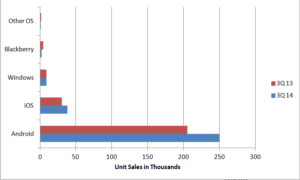The development of the smartphone market was easy to follow from the outside. After Apple introduced the iPhone the company started with almost 100% market share, a number that was expected by everyone to shrink as other players entered the market. As it turned out, Android and iOS were about to dominate this space for many years. As a matter of fact, the mobile device market is so dominated by Android, that even iOS barely makes it above the 10% mark.
This is shown in the following table as published in the latest press release from Gartner about smartphone shipments in the third quarter of 2014.
Worldwide Smartphone Sales to End Users by Operating System in 3Q14 (Thousands of Units)
|
Operating System |
3Q14 Units |
3Q14 Market Share (%) |
3Q13 Units |
3Q13 Market Share (%) |
| Android |
250,060.2 |
83.1 |
205,243 |
82.0 |
| iOS |
38,186.6 |
12.7 |
30,330 |
12.1 |
| Windows |
9,033.4 |
3.0 |
8,916 |
3.6 |
| Blackberry |
2,419.5 |
0.8 |
4,401 |
1.8 |
| Other OS |
1,310.2 |
0.4 |
1,407 |
0.6 |
| Total |
301,009.9 |
100.0 |
250,296.8 |
100.0 |
Source: Gartner (December 2014)
The numbers may shift a little bit more based on the successful launch of the iPhone 6, but nobody is betting on a reversal of this market trend anytime soon. The numbers also suggest that overall smartphone sales may be higher than many expected in the beginning of the year. 2015 could be on the way to very strong smartphone sales.
Display Daily Comment
This is unless Digitimes Research is correct in its forecast that says that smartphone sales based on new platforms will not only be increasing in 2015, but will increase significantly. While this seems a little counter intuitive, a closer inspection of the text makes more sense.
According to the forecast, Digitimes sees the use of “newly emerging platforms, including Android One, Firefox OS and Tizen” increasing this year. The inclusion of Android One in this list makes the forecast a little ambivalent. Android is the market leader and pushing a simple version of the same OS into cheaper phones does not change the overall market share.
The report’s main reasoning for increased interest in these alternative OS-based smartphones is the growing demand in the low cost smartphone market. It also mentions the decreased offering of feature phones as another driver for the low end smartphone devices.
This is an interesting view nevertheless, as it shows that the low cost smartphone market is gaining power and demands not only lower component pricing but also a simpler software platform. Android One may be in a very good position with a massive app library available to the user. Key features of Android One are that there is no manufacturer-specific overlay and Google promises ‘always up to date software’ by automatically updating to the latest software version. – (NH)

